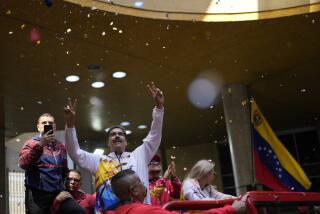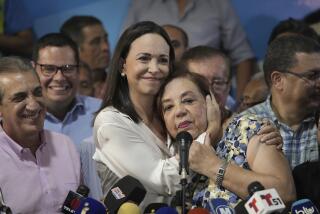Gustavo Dudamel has tried to stay out of politics. Now, he’s demanding action in Venezuela

L.A. Philharmonic’s Gustavo Dudamel is one of the world’s best-known Venezuelans. (May 5, 2017) (Sign up for our free video newsletter here http://bit.ly/2n6VKPR)
Under normal conditions, the news about Gustavo Dudamel this weekend would focus on his return to Walt Disney Concert Hall after a three-month absence to begin a rare cycle of Schubert symphonies.
But these are not normal conditions.
On Thursday, the Los Angeles Philharmonic music director, who is one of the world’s most famous musicians and among its best-known Venezuelans, publicly called on Venezuela’s president to “listen to the people” and end the protest violence that has resulted in more than 29 deaths.
After months of being pressed to use his superstar status to speak out on the subject, Dudamel has decided get political.
For years, Dudamel has attempted to remain above politics, despite dramatically intensifying poverty and privations in his home country under the regime of Nicolás Maduro. Even as his star rose, Dudamel feared that speaking out politically would endanger El Sistema, Venezuela’s extraordinary, and government-funded, music education program that provides opportunity to hundreds of thousands of disadvantaged youths and of which he is the leading symbol.
In the end, however, it was El Sistema that changed the maestro’s mind. On Wednesday a 17-year-old violist from one of the El Sistema youth orchestras was killed during a demonstration in Caracas. In a matter of hours Dudamel had shaken off whatever reluctance he had to go public and issued a statement titled “I Raise My Voice” in which he deplored the violence and repression of the current regime and declared: “Enough is enough.”
For Dudamel’s critics who have long demanded that he speak out in opposition of the current regime, the open letter, which he posted on his social media accounts, won’t be enough.
But in a wide-ranging conversation in his Disney Hall office a few days earlier, Dudamel — who is facing new leadership opportunities at the L.A. Phil as the orchestra’s current president and chief executive heads to the New York Philharmonic — explained how his thinking has evolved during what has become the greatest trial in his life.
“My position hasn’t changed,” Dudamel says. “But the crisis [in Venezuela] is true.”
Food staples and medicine shortages are severe throughout the country. Unemployment and inflation are soaring. Caracas, the capital, has one of the highest murder rates in the world. Massive street protests accusing the president of dismantling what was once held to be a model South American democracy have become ubiquitous.
Last week, in response to the country’s deteriorating conditions, Dudamel released a 55-second video in which he grimly instructed Venezuela’s leaders to put aside their political egos and stop what he called the fratricide.
But the language was too equivocal to do more than annoy partisans on either side. Speaking three days later for this interview, he is willing to say more.
“If the people are asking for something,” he says, “let’s listen and do something. Why do we have to wait? Every minute counts. We don’t need more blood. It’s not right for people to be dying in demonstrations. We need voices that unite Venezuela.”
Dudamel still clearly wants to keep El Sistema out of partisan politics. Venezuela is the only country in which the right to a musical education is written into the constitution. “El Sistema,” he notes, “has withstood many political crises. Politically and economically, the ’80s were not good. The ’90s were not good. And we have grown only stronger.”
Some have accused El Sistema, and Dudamel, of being used as propaganda for Maduro. Since El Sistema is part of the executive branch, Dudamel and the orchestras can be called on from time to time to play at government functions, and Maduro likes nothing better than photo ops with the kids.
Dudamel says he doesn’t take the anger that is directed against him personally. “I suffer for the country. But at the same time I have been attacked for many years. This is nothing new.”
He points out that El Sistema is a social program in which all manner of students learn to find common cause in youth orchestras. Music, Dudamel believes, can help build a more responsible new citizenry, serve as glue in a divided country.
“I play for everybody,” he says. “You cannot imagine how many times I have played for 50,000 in a stadium. You think that people believe in one side or the other? No, they believe in different things. But they are united there.
“The same is true in the Bolívars,” he contends, speaking of the Símon Bolívar Symphony Orchestra of Venezuela that developed out of the youth orchestra and that he heads. “Everyone believes in their different ideas, but never have I seen a fight in the orchestra.”
It’s not like that in the streets, though. As the population becomes more desperate, the El Sistema ideals are being tested. Even its constitutional right may be at risk; Maduro has proposed rewriting the constitution. Dudamel emphasizes that his comments are directed at the country’s leaders, not the people, whose suffering he knows cannot be ignored any longer and who, he contends, have every right to be angry and to peaceably protest.
“I address the leaders,” he says. “You, as a leader, are an observer of the people. You have the elements to solve the problems, and you have to solve them.
“If a way to get out of this is to go to elections,” he adds, “that is what we will have to do. We have a democracy, and we have to respect that.”
By elections, he means the general elections protesters have been calling for, not a specific election on the new constitution, which the opposition party has called a sham. Maduro, whose approval rating has sunk to 21%, and his supporters would surely lose national and regional elections at the moment.
Dudamel believes many of the problems in Venezuela are due to a lack of discipline, political corruption and the need for vision. “Our children have to see that the leaders are an example of peace, of hope. I sound like a hippie, but it’s true. We have to give to our children that example, not confrontation all the time. People are tired of that.”
“Yes, there is a polarization, but the middle is huge,” he says. “I believe more than 60% want peace. They only want to work and to get out of this crisis in a peaceful way. We are at heart a country of peace. We haven’t seen war in Venezuela in the past hundred years.
“This is a moment of anger,” he explains, “an irrational moment. Because of their suffering, people get provoked.”
Indeed, he says this only makes him more convinced that the way to find a solution is for opponents to air their differences.
“That kind of confrontation, or interaction or dialogue,” he continues, “will create something important.” People’s attitude, he explains, should be: “I don’t want to change the way you think. But I want you to listen to me and to understand that I have my own visions. And let’s do something with that.”
In the end, Dudamel continues to put his faith where he always has: in music, in hope and in youth. Monday it was announced that he will bring this new National Youth Orchestra of Venezuela to the Hollywood Bowl on Sept. 17 as part of the citywide Pacific Standard Time festival.
“Maybe I’m naive, but I’m clear in what I believe,” he says, insisting he has seen it work over and over again.
He points to a day last week in Caracas. The streets were a war zone, but 1,000 young people showed up for the first day of auditions for a new orchestra El Sistema is creating for teenagers.
“When I see these 1,000 children auditioning for something that will give them hope, that is a symbol,” he says. “We have to keep playing, with the goal to unite. I want to unite my country.”
More to Read
The biggest entertainment stories
Get our big stories about Hollywood, film, television, music, arts, culture and more right in your inbox as soon as they publish.
You may occasionally receive promotional content from the Los Angeles Times.







